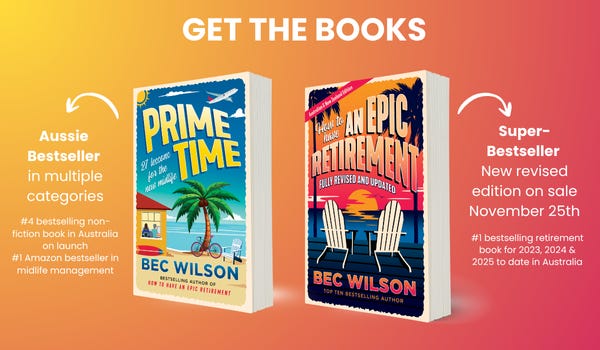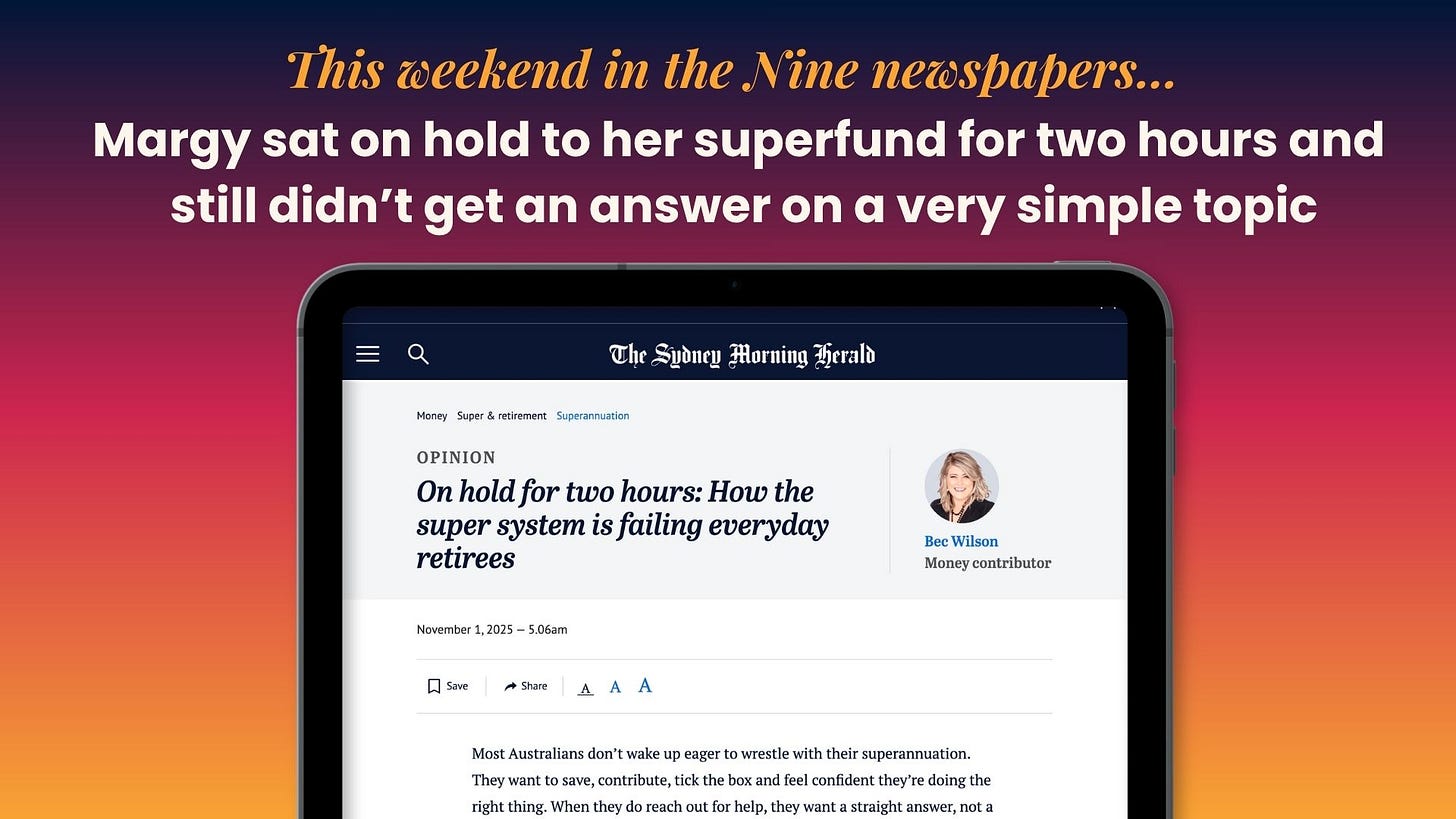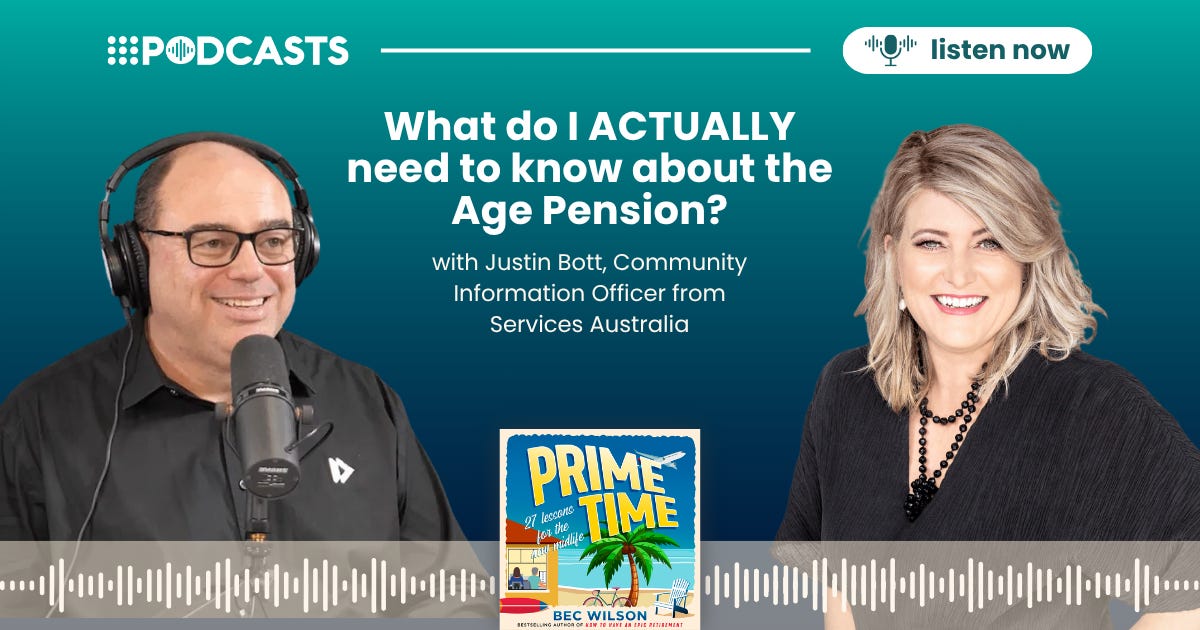Planning how to retire
Most people don’t choose when or how they finish work. It just… happens to them. But we can change this.
In this edition
Feature: Planning how to retire
From Bec’s Desk: New website domains for us
SMH/TheAge: On hold for two hours: How the super system is failing everyday retirees
Prime Time: What do I ACTUALLY need to know about the Age Pension?
Ad - Before we start — a big thanks to our newsletter sponsor this week, Viking
Fly free to Europe, Egypt, Asia or more with Viking*
Discover the rivers of the world with Viking. Whether you’re strolling the banks of the Seine in Paris, sipping wine in Austria’s Wachau Valley, or exploring Egypt’s ancient temples, our itineraries are designed to immerse you in the world’s cultures.
For a limited time, you can enjoy 8 days in Europe in 2026 or 2027 from just $5,395pp, with return flights to Europe included (valued up to $2,500pp)*. Ornate castles, medieval towns and spectacular sites await. Explore Europe with no kids, modern ships and everything you need included. Explore The Viking Way.
Planning how to retire
Have I told you lately that I love my job? It feels good to help people understand the systems and choices available to them as they approach retirement. But over the past year, something’s been on my mind that I can’t shake. People don’t seem to know how to retire. And I don’t mean financially.
Only 31% of Australians (and Brits) retire by choice. The rest are pushed — by health, redundancy, or plain old ageism. In other words, most people don’t choose when or how they finish work. It just… happens to them.
And that bothers me. Because when I talk to people in midlife, I see so much possibility, yet so many feel like passengers instead of drivers when it comes to their next stage of life. I want to help more Australians take ownership of that transition… to make retirement a journey, not a shove at the end.
And I’m going to need your help. Because the real conversations about what happens next don’t happen in boardrooms or planning meetings. They happen in workplaces, by the watercooler, and around family barbecues.
That’s where we find out what people are really thinking, what they’re excited about, what they’re scared of and where we can gently share what we’ve learned. That there are options. That there are choices. That it’s okay to want something different for the next chapter.
If we can help more people see pre-retirement and retirement as something to shape, not something that happens to them, we’ll change a lot more than just the numbers. We’ll change how people feel about growing older — and that’s worth getting behind.
The reality we don’t talk about enough
The average Australian plans to retire around 65 or 66. But life doesn’t always cooperate. Around six or seven in ten retire early for reasons they didn’t plan like health changes, redundancy, or caring responsibilities.
The result? Many people hit retirement age financially or emotionally unprepared, simply because they didn’t get to choose the timing. But making retirement more of a choice isn’t just a luxury, it’s a skill. And we can all learn it and learn to run up to retirement differently.
Reshaping the off-ramp
What if we stopped thinking about retirement as a hard stop and started treating it like a process we can learn about? A roadmap with twists and turns, not a cliff.
You could ease out of full-time work. You could re-skill, work part-time, consult, mentor, start something smaller. You could build an “exit plan” that’s about both money and meaning. Because this phase isn’t about slowing down, it’s about doing things differently.
So what can we effect to make change to this 31%? (My secret goal is to see it closer to 75% by the time I retire - I hope)
Health: It’s the biggest predictor of whether you get to choose your retirement date.
Skills: Staying relevant keeps the workplace doors open longer than any super balance can.
Mindset: People who see midlife as a transition to something new — not an ending or a frustration — adapt better when change inevitably arrives.
Money: Of course, financial confidence is important. When people understand their money, and how the financial systems of retirement work - they can make more active choices.
So start thinking early about how you want to work, not just how long.
There’s a bigger conversation here
I think we need to talk about this more, and not in financial jargon, but in real terms.
How do we design exits from workplaces that feel good - and that allow us dignity and celebration - but a slower path out? And how do we make the later years of work feel flexible and packed with hope and opportunity instead of a period of work-life to be afraid of and to hide from?
Because while most people plan for retirement financially, very few plan how to retire. And that’s where I think the whole ballgame changes.
A quick one this week - I promise.
This week we’ve been putting the finishing touches on The How to Have an Epic Retirement Flagship Course - a completely new edition and our last course which for 2025. It launches THIS THURSDAY. I’m so happy with it I want to share it with you all - so this weekend we’re offering you the opportunity to watch a video from the NEW program, Module 2, video 3 before the Earlybird deal closes at 6pm on Sunday night (yep - tonight!). You can watch it here. And if you want to book your place, there’s still time. Book now.
This week was mostly spent recording my new audiobook for the new Aussie/New Zealand edition of How to Have an Epic Retirement. I’m four days into reading it into a microphone six hours a day. It’s a massive job! And, straight after I go into the same studio to read the new UK edition of the same book.
Some of you may have noticed that this week we quietly migrated our website and email addresses to new URLs – everything now lives under epicretirement.net instead of epicretirement.com.au. All the old addresses have been redirected though. So if you’re seeing slightly different addresses pop up in your inbox and on the websites, that’s why. It’s us, at a new, more global domain!
It’s part of something exciting: we’re getting ready to launch into New Zealand and the UK, with editions of the books written directly for those audiences. It feels like we’re stepping into the next phase — a little nerve-wracking, but full of possibility.
If you want to pre-order the new Australian edition of How to Have an Epic Retirement, you’ll need to do it through a specific new link. Order links:
Epic Retirement book: NEW AU/NZ EDITION OUT 25 NOVEMBER (not long now!) https://amzn.to/3WNLfDv
Prime Time book: https://amzn.to/4hE1kFq
Now, I want to start answering your questions in my reels on Facebook and Instagram. I’m back in the swing of making these regularly. If you have questions you’d like me to cover - email me at bec@epicretirement.net.
Have a great week.
Author, podcast host, columnist, retirement educator, and guest speaker
Extract of of my weekly column in The Age, The Sydney Morning Herald, Brisbane Times, WA Today.
On hold for two hours: How the super system is failing everyday retirees
Most Australians don’t wake up eager to wrestle with their superannuation. They want to save, contribute, tick the box and feel confident they’re doing the right thing. When they do reach out for help, they want a straight answer, not a long wait and a brush-off.
This week one of our members, Margy, hit the wall.
She’d just received a redundancy and decided to put a lump sum into her super. Keen to get the money out of her bank account and working for her retirement, she made the deposit, then rang her fund to confirm how it should be recorded for tax purposes. Should it count as a non-concessional contribution, or could she claim it as a concessional one?
She knew she’d already paid income tax on the money this financial year, but she also still had room left in her concessional cap. What she needed was a clear explanation of the best way to classify the contribution so she didn’t end up paying more tax than she had to.
Instead, she got stuck in the system. The wait time to speak with someone at one of Australia’s largest super funds was 130 minutes. And it wasn’t tax time, or even a particularly busy week.
When she finally reached a person, they spent another half hour trying to figure out what she was asking. First, she was told to lodge a form. Then, she was told maybe she shouldn’t. The staffer seemed unsure about the differences between concessional and non-concessional contributions and had to check.
Margy just needed someone – or something – to guide her clearly, at the right time, with the right words.
Finally, she was referred to the ATO because “it’s a tax matter”. She then sat on hold for another 30 minutes, only to be sent straight back to her fund to check whether she’d lodged the right form.
At no point did anyone actually explain what concessional and non-concessional contributions are, or why the distinction mattered. And therein lies the problem.
Read on — this article continues in The Age, The Sydney Morning Herald, Brisbane Times and WA Today. It is free to read - you may have to sign up, but there’s no paywall on my articles.
What do I ACTUALLY need to know about the Age Pension?
This week on Prime Time, we’re talking about the Age Pension and how it works. The Age Pension in Australia is an important safety net in retirement, but for so many people, working out if you’re eligible, when you become eligible, and how to actually apply can feel like a minefield.
So today, I’ve brought in the expert: Justin Bott, from Services Australia. Justin has spent decades helping people navigate the pension system and in this episode, he breaks it down in plain English. We talk eligibility rules, assets tests, income cut-offs, common traps, and why the pension isn’t just for people who never built up wealth — it’s something many Australians end up relying on at some point in their retirement.
He also shares why it’s a good idea to lodge your application early (you can apply up to 13 weeks before you qualify), how the online system works, and the three key dates to remember each year in case you suddenly tip into eligibility.
If you’ve ever looked at the pension and thought “I don’t get it” — this episode is for you.











